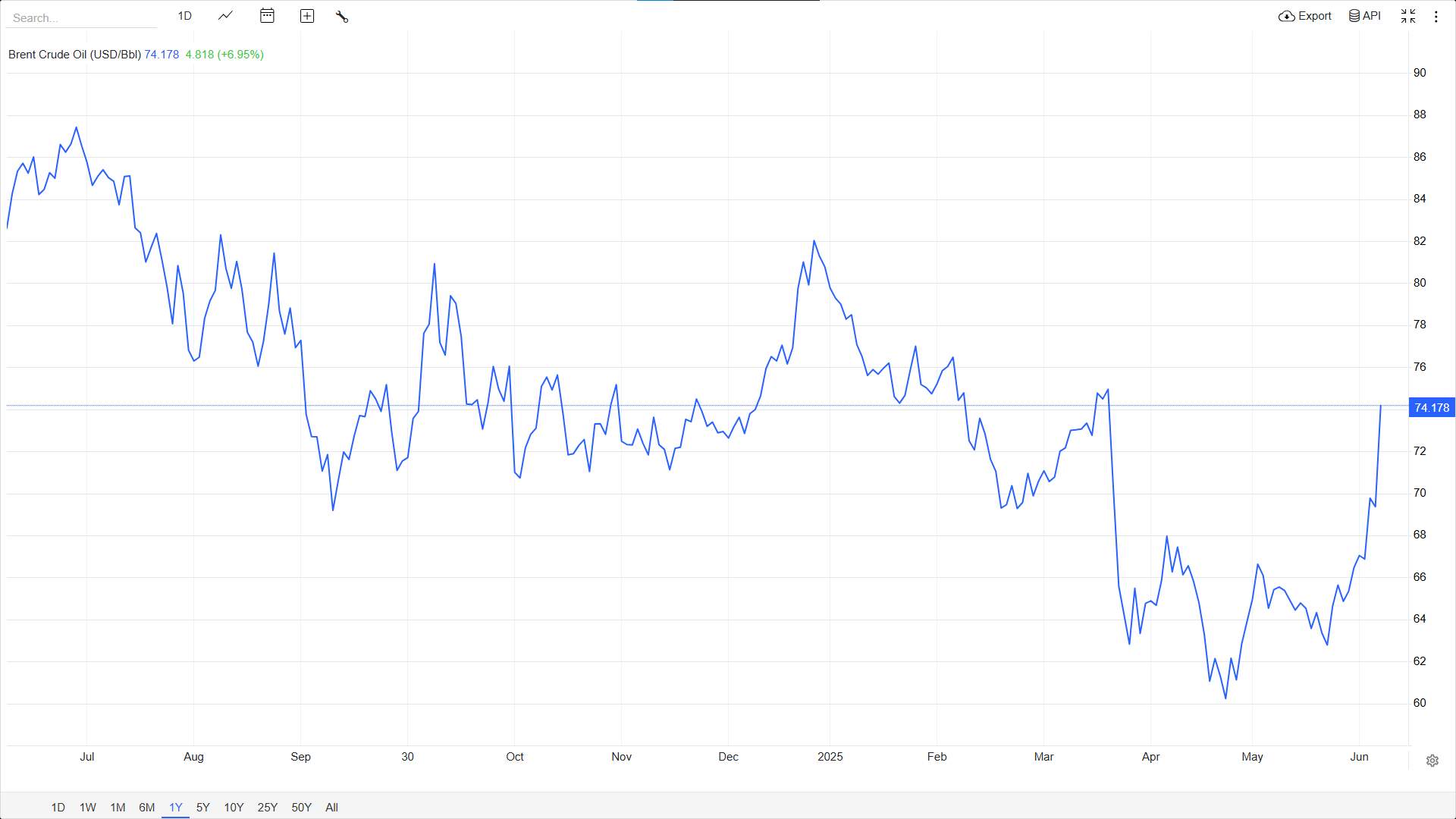Crude Oil Prices Spike as Middle East Conflict Intensifies
Global oil markets were jolted Friday after Israel launched a series of military strikes on Iran, causing crude oil prices to surge to their highest levels in nearly five months. The attack, which reportedly targeted Iran’s nuclear facilities, ballistic missile production sites, and military leadership, has significantly heightened fears of a broader regional conflict that could disrupt critical energy supplies.

Brent crude, the international benchmark, climbed as high as $78.50 per barrel before settling around $73.96 — a gain of over 6.6% by mid-morning trading. U.S. West Texas Intermediate crude mirrored this spike, reaching $77.62 before easing slightly to $73.03, still up over 7% on the day.
These intraday gains are the largest since 2022, when Russia’s invasion of Ukraine caused a similar oil shock. Analysts and traders warn that the market is reacting to fears of supply disruption, especially concerning the strategically crucial Strait of Hormuz — a narrow chokepoint through which nearly 20% of the world’s oil supply transits daily.
Why the Oil Market is Nervous
Iran, one of the world’s top oil producers, exports much of its oil to China. The recent rise in Iranian shipments over the past year has largely been fueled by Chinese demand, despite ongoing international sanctions limiting Tehran’s oil infrastructure and modernization. An interruption in Iranian oil exports could pressure China to seek alternative supplies, tightening the market further.
However, it’s Iran’s geographic position that is raising the most alarms. Positioned on the northern edge of the Strait of Hormuz, Iran has previously threatened to block the strait in times of heightened conflict. Such a move could halt not only Iranian oil exports but also disrupt shipments from Saudi Arabia, the UAE, and other key producers.
Meghan O’Sullivan, director of the Belfer Center at Harvard Kennedy School and a former U.S. deputy national security adviser, warned that any attempt by the U.S. to reopen the strait militarily could escalate the conflict further and increase regional instability.
“If the Strait of Hormuz is choked, it’s not just Iran that’s affected — global oil prices could skyrocket, and broader energy security is at stake,” she noted.
Israel’s Military Operation and Iran’s Response
Israel’s government confirmed the strike on Iran early Friday, stating that the military targeted critical infrastructure linked to Tehran’s nuclear ambitions. The attack is reportedly the start of a “prolonged operation” aimed at neutralizing Iran’s nuclear and missile capabilities.
In response, Iran’s Supreme Leader Ayatollah Ali Khamenei vowed “harsh punishment” for Israel, as reports confirmed the deaths of several Iranian commanders. As the world watches for potential retaliation, markets remain on edge over the possibility of a broader war in the Middle East.
Global Reactions
The risk of a wider regional war involving Iran and its allies — including proxy militias operating in Iraq, Syria, and Yemen — could threaten additional oil-producing infrastructure across the region. While analysts say it’s too early to determine whether Iran will retaliate by targeting oil flows, the fear alone is driving up prices.
Amarpreet Singh, an analyst at Barclays, commented, “There has been no direct impact yet on oil production or infrastructure, but the market is now pricing in a much higher risk premium.”
RBC Capital analyst Helima Croft emphasized that if oil infrastructure becomes a direct target, or if tankers are blocked from passing through the Strait of Hormuz, prices could spiral further.
U.S. and OPEC May Step In
Amid surging prices and investor anxiety, U.S. Secretary of State Marco Rubio clarified that the United States was not involved in the Israeli operation and urged Iran not to retaliate against American forces or interests in the region.
Still, geopolitical analysts say the U.S. may be forced to intervene diplomatically or militarily to keep oil flowing if Iran acts on its threats.
“If oil is caught in the cross-fire,” said Croft, “President Trump will likely pressure OPEC to release spare capacity to cool markets and protect U.S. consumers.”
Markets React Sharply to the News
Global financial markets reflected the turbulence. Stocks across Asia fell sharply, while U.S. futures pointed to steep declines. Investors sought safety in traditional havens, pushing up the value of gold and the Swiss franc.
The $10 per barrel rise in oil over the last three trading days now stands as the largest such jump since early 2022. Despite no physical disruptions yet, the psychological impact of the Israel-Iran conflict has added significant volatility to an already sensitive global energy market.
Crude Oil Prices Market on Edge
As of now, crude oil prices remain elevated as traders assess the potential fallout. Whether this conflict will escalate into a broader regional war — or if diplomatic efforts will restrain the tensions — remains uncertain. What’s clear is that energy markets are bracing for impact, with crude oil prices and oil security now deeply intertwined with Middle Eastern geopolitics.


